B2B CRM software has become a cornerstone for organizations aiming to streamline operations, enhance customer relationships, and drive sales growth.
Many B2B companies face significant challenges operating without a dedicated CRM system, including inefficient data management, fragmented customer interactions, and missed sales opportunities.
Selecting an appropriate CRM tool is crucial for optimizing customer relationships and sales processes, ensuring businesses remain competitive and responsive to their client’s evolving needs in an increasingly digital marketplace.
What Are B2B CRM Software?
B2B CRM software (business-to-business customer relationship management) refers to, specialized software designed to manage interactions and relationships between businesses and their corporate clients or customers.
Unlike B2C CRMs that focus primarily on individual consumers, B2B CRMs are tailored to handle the more complex, multi-faceted customer relationships and extended sales cycles typically seen in business-to-business interactions.
These sophisticated systems emphasize personalized client relationships, intricate deal tracking, and comprehensive communication management, distinguishing them from their B2C counterparts in both, functionality and scope.
Benefits of Using B2B CRM Software
1. Centralization of Customer Data and Interactions
B2B CRM software serves as a central hub for all customer data and interactions, providing a unified platform for seamless access to critical information.
This centralization ensures that all team members, from sales representatives to customer service agents, work with the same up-to-date information.
By consolidating emails, phone calls, meetings, and transaction history in one place, businesses can provide a more personalized and consistent customer experience across all touchpoints.
2. Increased Efficiency and Enhanced Customer Experience
With B2B CRM software, businesses can significantly boost operational efficiency by automating repetitive tasks such as data entry, follow-up emails, and customer segmentation.
This automation frees up valuable time and energy to focus on more strategic activities that require human insight and creativity.
Moreover, customers benefit from quicker response times and more tailored interactions, leading to an enhanced overall experience that can improve loyalty and drive long-term business growth.
3. Informed Decision-Making Through Analytics and Metrics
B2B CRM systems come equipped with robust analytics and reporting tools that provide deep insights into customer behavior, sales trends, and performance metrics.
These powerful analytical capabilities enable businesses to make data-driven decisions with confidence.
By understanding what drives customer engagement and sales conversion, organizations can refine their strategies, allocate resources more effectively, and continuously improve their outcomes in a competitive market.
4. Precision in Outreach via Customer Segmentation
Effective customer segmentation is a hallmark of advanced B2B CRM software.
By categorizing customers based on specific criteria such as industry, company size, purchasing behavior, and engagement level, businesses can tailor their marketing and sales efforts with precision.
This targeted approach ensures that messages resonate with the intended audience, leading to higher conversion rates, improved customer retention, and more efficient use of marketing resources.
5. Customer Retention Opportunities
B2B CRM software plays a crucial role in identifying at-risk customers and developing proactive strategies to retain them.
Through features like automated follow-ups, personalized communication, and early warning systems for customer dissatisfaction, businesses can address concerns promptly and build stronger, more resilient relationships.
This proactive approach not only reduces churn rates but also promotes long-term loyalty, turning customers into advocates for the brand.
Key Features Required in B2B CRM Software
1. Lead Management With B2B CRM Software
Effective lead management tools and features are crucial for converting prospects into paying customers in B2B sales.
A robust B2B CRM software should offer comprehensive tools for tracking and nurturing leads from initial contact through to conversion.
Essential features include lead scoring to prioritize high-potential prospects, automated follow-ups to maintain engagement, and detailed activity tracking to provide a 360-degree view of each lead’s journey.
2. Data Management
Easy data import/export capabilities are essential for maintaining accurate and up-to-date customer information in a B2B CRM system.
The software should allow seamless integration with existing data sources, ensuring that all relevant information is readily accessible and easily manageable.
Advanced data cleaning and deduplication features are also valuable for maintaining data integrity and ensuring that decision-making is based on reliable and up-to-date information.
3. B2B CRM Software Customization
The ability to customize the CRM to fit specific business needs is a significant advantage in the B2B sector.
Look for software that, allows you to tailor lead categories, sales pipelines, and dashboards to align with your organization’s unique processes and workflows.
This level of customization ensures that the CRM becomes a natural extension of your business operations, rather than a one-size-fits-all solution that requires significant adaptation.
4. Third-Party Integrations
B2B CRM software should integrate seamlessly with other critical business systems such as email marketing platforms, accounting software, and e-commerce solutions.
These integrations enable a unified approach to managing customer interactions and streamline operations across different departments.
The ability to connect with a wide range of third-party tools can significantly enhance the CRM’s functionality and ensure it remains a central part of your business technology stack.
5. Remote Access
In today’s work environment where remote work is a norm, having cloud-based accessibility with robust data security provisions is essential.
B2B CRM software should offer secure remote access, allowing team members to work effectively from anywhere while ensuring that sensitive customer data remains protected and compliant with industry standards.
Mobile apps and responsive design are important features to look for in this context.
6. Team Collaboration Using B2B CRM Software
Features that facilitate internal communications and document sharing are vital for fostering collaboration among team members in a B2B setting.
A comprehensive B2B CRM should include tools for sharing notes, assigning tasks, and project collaboration on a real-time basis.
These collaboration features ensure that everyone in the organization is aligned and working towards common goals, enhancing overall productivity and customer service.
Top B2B CRM Software Solutions for 2024
When selecting the right B2B CRM software for your organization, it’s essential to consider the various options available in the market.
Here are some of the top B2B CRM solutions I recommend you use for 2024, each with its unique strengths and features:
1. Salesforce
Features and Functionality:
Salesforce offers an extensive array of features including advanced lead management, opportunity tracking, workflow automation, and robust reporting capabilities.
Its comprehensive dashboard provides real-time insights into sales performance and customer interactions, enabling data-driven decision-making at all levels of the organization.
Marketing Automation:
Salesforce’s Marketing Cloud allows for sophisticated marketing automation, helping businesses create personalized strategies for customers across multiple channels.
It supports advanced email marketing campaigns, social media engagement strategies, and targeted advertising initiatives, all seamlessly integrated with CRM data.
Unique Selling Point:
Salesforce’s unparalleled scalability and extensive customization options make it particularly suitable for large enterprises with complex needs.
Its vast AppExchange marketplace allows for seamless integration with a wide range of third-party applications, creating a highly flexible and adaptable ecosystem.
Cost:
Salesforce is a premium paid platform with various pricing tiers based on the features and number of users required.
While it does not offer a free version, it provides a free trial period for businesses to evaluate its capabilities before committing.
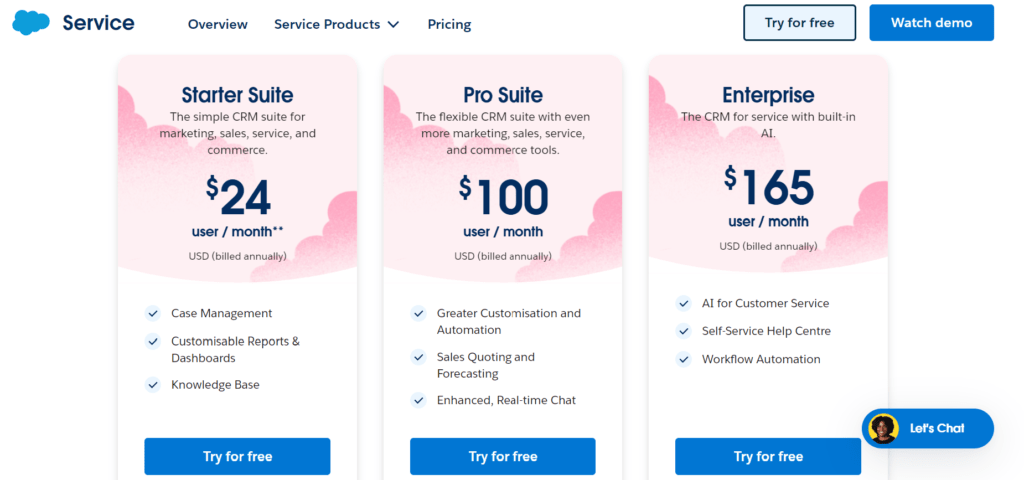
Integrations:
Salesforce boasts an impressive array of integrations with numerous third-party tools, including popular email marketing platforms like Mailchimp, accounting software such as QuickBooks, and various e-commerce solutions, making it a versatile choice for businesses with diverse technology needs.
For more info visit : Salesforce
2. HubSpot CRM
Features and Functionality:
HubSpot CRM is renowned for its user-friendly interface and powerful tools for contact management, deal tracking, and sales pipeline visualization.
It offers email tracking, meeting scheduling, and task management features that streamline the sales process and improve team productivity.
Marketing Automation:
HubSpot excels in marketing automation, providing a comprehensive suite of tools for email marketing, social media scheduling, and content management.
Its marketing hub integrates seamlessly with the CRM to create cohesive, data-driven marketing campaigns that align closely with sales efforts.
Unique Selling Point:
HubSpot’s ease of use and seamless integration with its marketing tools make it a favorite among businesses looking to enhance their marketing strategies.
Its intuitive design and comprehensive training resources make it accessible to teams of all skill levels.
Cost:
HubSpot CRM offers a robust free version with basic features, making it an attractive option for small businesses and Individuals.
Paid versions unlock advanced features like reporting, automation, and more extensive integrations for growing businesses.
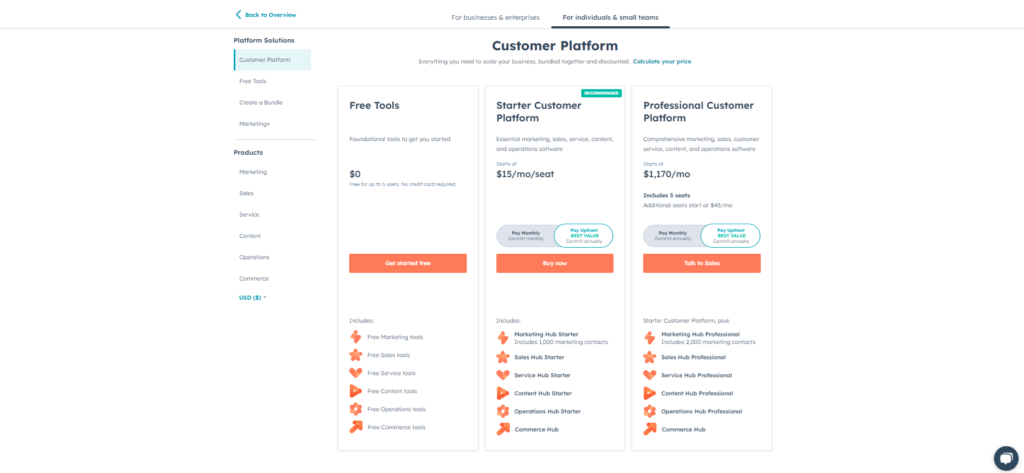
Integrations:
HubSpot integrates with a wide range of tools, including email marketing platforms, project management software, and customer service applications, allowing for a highly connected business technology ecosystem.
For more info visit : HubSpot
3. Zoho CRM
Features and Functionality:
Zoho CRM provides a well-balanced mix of features including comprehensive lead and contact management, sales automation, and analytics.
It supports extensive customization to fit specific business processes and workflows, making it adaptable to various industries and business models.
Marketing Automation:
Zoho CRM’s marketing automation tools include sophisticated email campaigns, social media marketing capabilities, and advanced customer segmentation features.
These tools help businesses effectively nurture leads and convert them into loyal customers through targeted, personalized interactions.
Unique Selling Point:
Zoho CRM’s affordability and seamless integration with other Zoho applications make it a versatile choice for businesses already using or considering Zoho’s comprehensive ecosystem of business tools.
Cost:
Zoho CRM offers both free and paid versions.
The free version is limited and includes basic features. Its paid version also has a 15-day free trial period
While the paid versions provide advanced functionalities and scalability options to suit growing businesses.
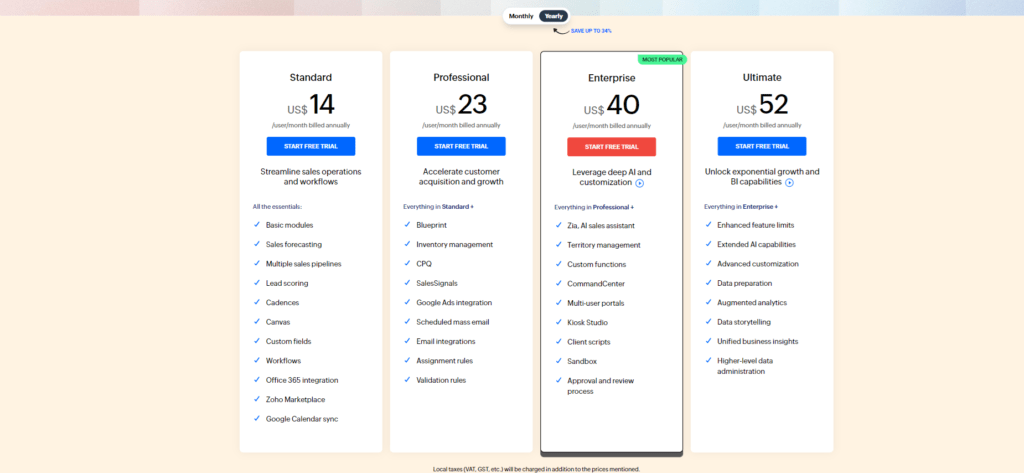
Integrations:
Zoho CRM integrates with numerous third-party applications, including popular email marketing tools, accounting software, and e-commerce platforms, allowing for a highly connected and efficient business technology stack.
For more info visit : Zoho
4. Pipedrive
Features and Functionality:
Pipedrive is known for its intuitive, visual sales pipelines and user-friendly interface.
It offers robust tools for lead management, activity tracking, and sales reporting.
The platform is designed to help sales teams focus on high-priority tasks and move deals through the pipeline efficiently.
Marketing Automation:
While Pipedrive’s native marketing automation capabilities are more limited compared to some competitors, it offers integrations with other marketing tools to enhance its functionality in this area.
This approach allows businesses to create a customized marketing automation setup that complements Pipedrive’s strong sales management features.
Unique Selling Point:
Pipedrive’s simplicity and visual approach to sales management make it an excellent choice for small to medium-sized businesses looking for an intuitive CRM that can be quickly adopted by sales teams.
Its focus on pipeline visualization helps keep teams aligned and focused on closing deals.
Cost:
Pipedrive is a paid platform with multiple pricing tiers to suit different business needs and sizes.
While it offers a 14-day free trial for evaluation purposes, there is no completely free version available.
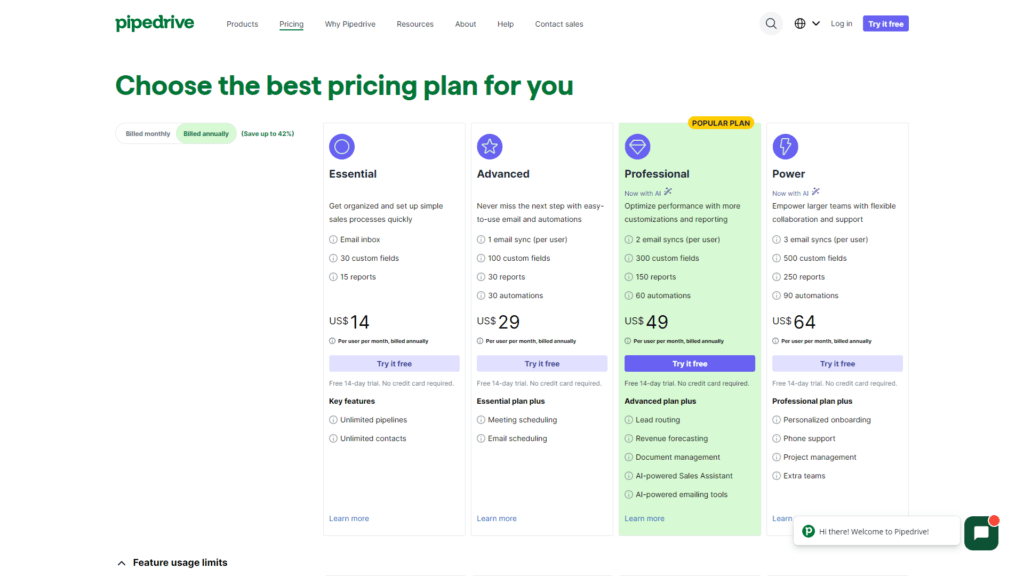
Integrations:
Pipedrive integrates with various tools, including email marketing platforms, customer support software, and productivity applications, allowing businesses to create a connected ecosystem that supports their sales processes.
For more info visit : Pipedrive
5. monday.com
Features and Functionality:
Created as a project management tool, monday.com has evolved into a capable CRM solution.
It offers highly customizable workflows, visually appealing dashboards, and comprehensive task management features.
It’s useful for teams that need to manage complex projects and customer relationships simultaneously.
Marketing Automation:
While monday.com lacks built-in marketing automation features, it integrates seamlessly with various marketing automation tools to provide a cohesive workflow.
This integration capability allows businesses to create custom marketing automation setups that align with their specific needs and existing technology stack.
Unique Selling Point:
monday.com’s visually appealing dashboards and flexible workflows make it stand out, especially for teams that prioritize visual data representation and project management integration within their CRM solution.
Its adaptability allows it to serve as a central hub for various business processes beyond traditional CRM functions.
Cost:
monday.com offers a free version up to 2 seats with limited features, making it accessible for small teams to test its capabilities.
Paid versions provide more advanced functionalities, including automation, integrations, and higher data storage limits to support growing businesses.
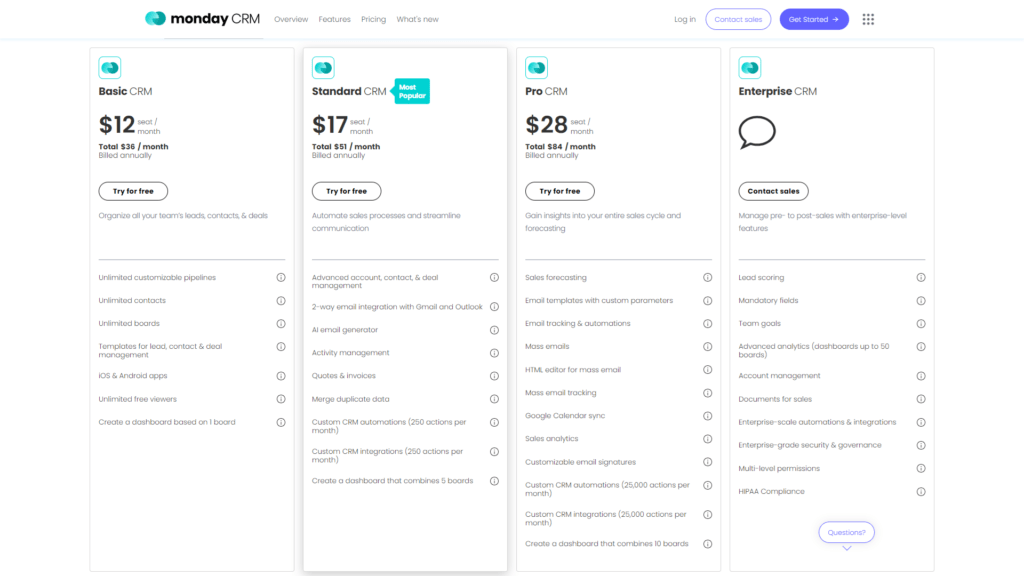
Integrations:
monday.com boasts an extensive range of integrations with popular applications, including email marketing platforms, project management tools, and communication software.
This wide array of integrations allows businesses to create a highly connected and efficient work environment.
For more info visit : monday.com
B2B CRM Software takeaway
In conclusion, B2B CRM software has become indispensable for businesses aiming to optimize customer relationships and streamline sales processes in today’s competitive environment.
By centralizing customer data, enhancing operational efficiency, and providing valuable insights through advanced analytics, CRM systems empower organizations to make informed decisions and deliver exceptional customer experiences consistently.
The benefits of implementing a B2B CRM solution are far-reaching, from improved lead management and customer segmentation to enhanced team collaboration and data-driven decision-making.
As businesses navigate increasingly complex customer relationships and extended sales cycles, the right CRM tool can provide the structure and insights needed to thrive.
When choosing a CRM system, it’s crucial to consider the specific needs, budget, and growth trajectory of your business.
The market offers a range of options, from comprehensive platforms like Salesforce to more specialized solutions like Pipedrive or the adaptable monday.com.
Each tool brings its unique strengths and features to the table, catering to different business sizes, industries, and operational requirements.
Ultimately, embracing the right B2B CRM software can transform your business operations, driving sustained growth and create strong and more profitable customer relationships.
As technology continues to evolve along with dynamic changes in the B2B landscape, staying ahead of the curve with a robust CRM solution is a key variable in maintaining a competitive edge in the B2B marketplace.
By carefully evaluating your options and aligning your choice with your strategic objectives.
You can leverage B2B CRM software to not only meet but exceed your customer relationship management goals, paving the way for long-term success and scalability in an increasingly digital business environment.

